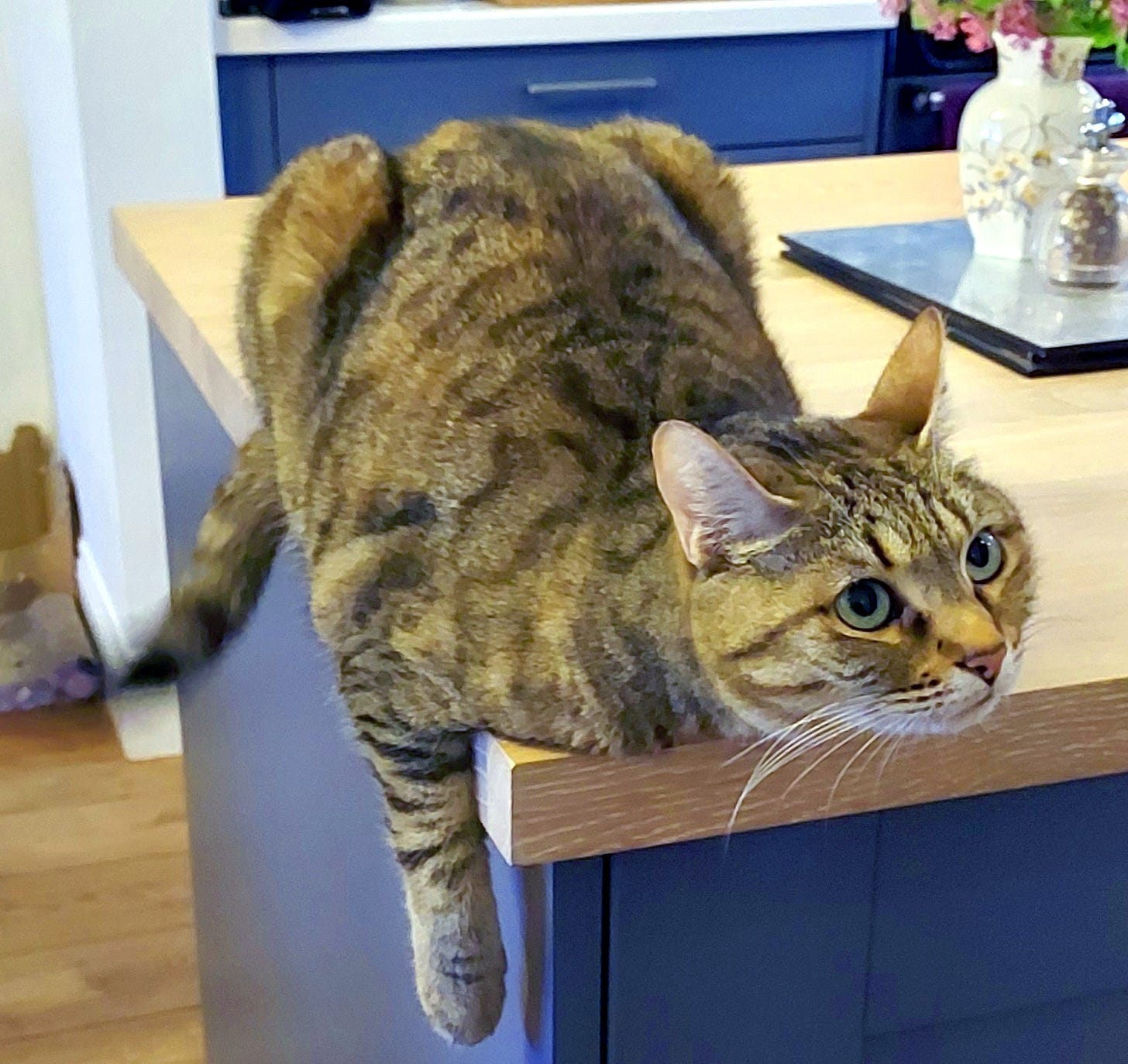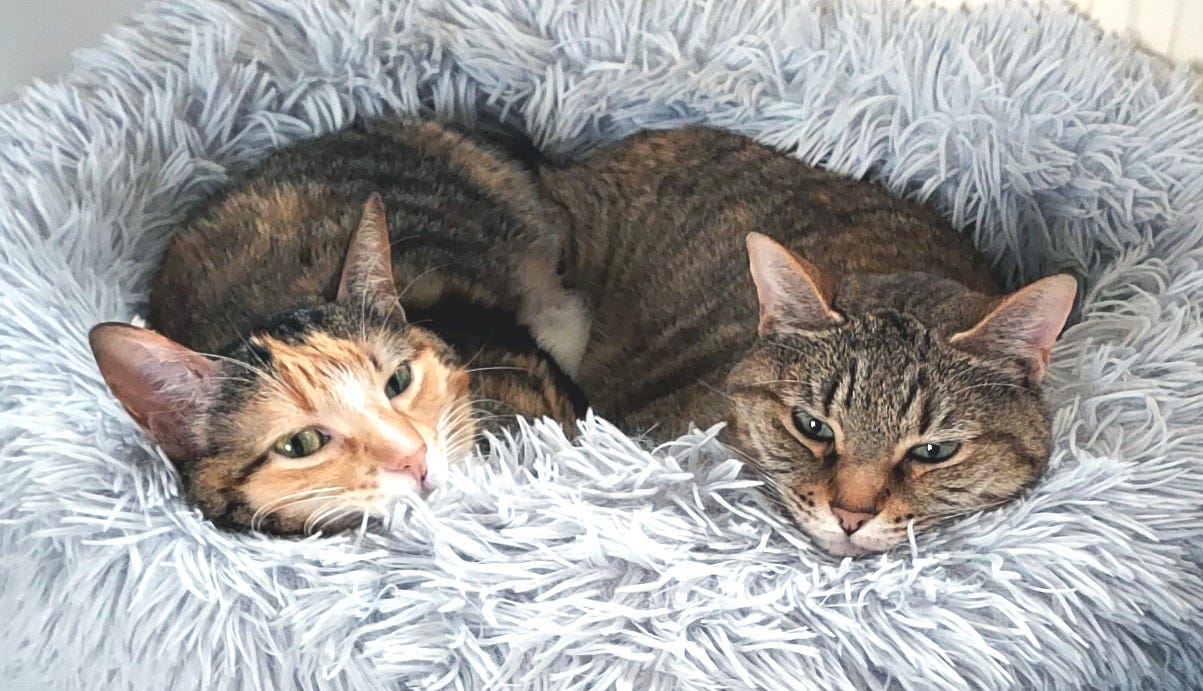Sid and Archie - Part 2: The Sting in the Tail
How 'musturbation' (read that again) holds us back and limits our lives.
Welcome to the weekly free post from Something More. This is the sequel to Sid and Archie: A Tail of Two Mindsets. If you haven’t read that article yet, I suggest you start there and then come back to this one.
I’m Caroline Ferguson – mindset trainer, therapist and your companion on this meander through the uplands and bogs of mindset, personal leadership and exploring a life that matters. If you’re a subscriber, hurrah! You’re among the first 99 folk to join this community and I’m very grateful. If you’ve arrived here due to a share or restack, come on in, we’re friendly :) Please do subscribe if you’d like to become a regular.
In the first instalment of the tale of these two cats, I introduced their very different personalities, the beliefs they hold, and how those beliefs influence their emotions and behaviour.
To recap:
SID is by far the more entitled of the kitties, yet she’s flexible and resilient in her thinking. She goes into situations expecting the best but she’s pretty good at processing disappointment and recovers quickly when life doesn’t deliver what she wants (which is usually a lap to snooze on or some polythene to lick. There’s little better in Sid’s world than sucking on a plastic bag. She’s weird that way).
Here’s my take on the belief that underpins Sid’s approach to life:
I know what I want and I believe I’m capable of getting it. But when life doesn’t deliver, although it’s annoying it’s not the end of the world. Not getting my way doesn’t mean I’m inadequate, just that it didn’t work out this time. I’m resilient and resourceful and I can always come back for another try.
Now ARCHIE, she’s a sensitive gal who loves being stroked and cuddled, but her insecurity means she isn’t entirely sure she deserves all that love. She craves attention so badly that she goes a little nuts when it arrives. It can take her quite a while to relax into being stroked and petted, even though it’s what she wants more than anything.
Nothing puts her nose out of joint more that Sid casually strolling onto her patch and claiming the prime lap spot when she, Archie, has put in all the work.
Archie shows up in the world with this belief:
I must be able to earn and keep your undivided attention – I MUST! Because if I can’t, it’s end-of-the-world awful, I can’t cope, and it means I’m rubbish.
And there it is, the most unhelpful type of belief we can hold.
MUSTS.
Ah, those imperatives. They do Archie – and those of us with opposable thumbs – no favours at all.
It might seem perfectly reasonable to want something (or not want it) to such an extent that we absolutely believe it must, should, has to, ought to happen. (Or mustn’t shouldn’t, etc.)
But there are several major problems with must-based beliefs:
They’re rigid, irrational and unhelpful.
No matter how much we insist that someone has to treat us with respect; or we mustn’t make a balls-up of the talk we’re about to give at work; there’s no law of the universe that says our demands are definitely going to be met.
To cling to this kind of story means we’re setting ourselves up for a fall if that person happen to be rude to us again, or we trip over our words during the talk and mess up the Q&A.
The stories we tell ourselves have consequences.
The late, great Albert Ellis, founder of rational emotional behaviour therapy (REBT) and one of the fathers of cognitive behavioural therapy (CBT), referred to demand-based thinking as “musturbation”. There, you knew I’d get to it eventually!
The toxic thing about musturbation is this: where there’s a must (or a mustn’t), a whole heap of “or else”s come piling in behind. I must get my way, or else…
Or else it’s really bad.
Or else I can’t cope.
Or else I’m not good enough.
Or else you – or others, or the world – are stupid, or mean, or scary, or dangerous.
We’re all different, of course, and not everyone will experience all of those or elses. The last two are particularly widespread and pernicious, though, because we’re attaching ours and/or other people’s value to what we believe must or mustn’t happen.
Human worth does not depend on our demands being met! We have intrinsic value because we exist, not because some story of ours says so.
It’s these or elses that lead to catastrophising, lack of resilience, low self-worth and knee-jerk judgement of others. You could say those states and behaviours have their origins in our childhood experiences, and that’s often true, but we maintain and amplify them as adults, based on the way we think.
The biggest problem is…
More often than not, these must-based stories, and the or elses that come tumbling after them, are unconscious. We’re winding ourselves up without even being aware that we’re doing it.
Talk about self-sabotage… quick, let’s have another cat pic.
This is why I believe self-awareness is the greatest life skill.
You’ll hear me talk about this a lot. If we aren’t aware of our beliefs, it’s incredibly hard to change our unhelpful stories and the catastrophising, low resilience and self-worth issues that can follow.
But if we can hear our unhelpful stories when they crop up, we can challenge and change them. Awareness gives us a choice to create a new story – one that can transform our approach and avert unhelpful consequences.
How are we supposed to want something strongly if demands are out?
We’re human. We want things (or don’t want them) really badly. That’s where Sid’s belief comes in. Remember this little nugget?
I know what I want and I believe I’m capable of getting it. But when life doesn’t deliver, although it’s annoying it’s not the end of the world. Not getting my way doesn’t mean I’m inadequate, just that it didn’t work out this time. I’m resilient and resourceful and I can always come back for another try.
The rational, flexible, pragmatic version of demanding something is wanting it strongly but accepting that it doesn’t have to happen.
Healthy thinking is about acknowledging that even if we don’t get what we very much want, we know that not getting it wouldn’t be the end of the world. We would be able to cope, because we’ve coped with every single thing so far in our lives. And it wouldn’t mean that we’re inadequate, just that we’re human and normal and fallible.
“Sometimes things don’t work out the way we want them to” is a realistic and healthy way to think. Sid gets it but Archie doesn’t seem to have taken my coaching on board, possibly because I don’t speak cat too well. Ah well, we love each other heaps anyway.
This, in a nutshell, is the mindset training work I do with my clients.
Our beliefs really do shape how we think, feel and behave; they determine the reality of how we experience this thing called life. I show my clients how to build self-awareness so they can hear and challenge their stories that are preventing them from being and doing their “something more”.
Each month I run a live mindset training session for paying subscribers here on Something More. Over the next few sessions, we’ll be diving deep into the five main ways I’ve identified in which we humans get in our own way.
My acronym for these hot-spots is PACES – they underpin all of our must-based beliefs. Once we understand what our individual PACES triggers are, it becomes so much easier to catch our unhelpful tales and remove the sting.
If you’d like to walk through your PACES with me in the coming months, join us from as little as £1.54 a week – that’s just half the price of a coffee. Your support enables me to keep working for you.
And finally…
I was invited by a fierce, brilliant friend, Katrina Collier, to be a guest on her podcast, Beyond the Damage of Words. Katrina and I are both what I call sensitive upstarts – we score highly for high sensitivity (HSP) and high sensation-seeking (HSS).
We had a rollicking chat about self-awareness, self-development work in the wake of trauma, life as sensitive upstarts and, of course, being born for something more. And you get to see me pulling silly faces! Have a watch/listen.
Until next week, have fun calling out your musturbation.








